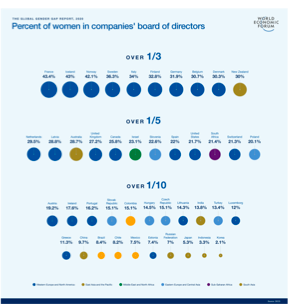A diverse team helmed by female leaders will give most value to our shareholders
By Julia Stamberger on Wednesday 23 March 2022

By Julia Stamberger on Wednesday 23 March 2022

The Planting Hope Company is one of the first public companies with an all-women board and C-suite on Canada's TSX Venture Exchange (TSXV). Co-founder and CEO Julia Stamberger explains why a diverse team headed up by women will deliver the best results.
Why is it important to have women in the C-Suite and on the board?
At Planting Hope, we believe an all-women board and C-suite is the best option for our company to create and sustain value while supporting our three core impact pillars: Nutrition, Sustainability, and Representation. We’ve grown our Hope and Sesame sesamemilk product line and celebrated many other successes over the past year.
None of this would have been possible without our powerhouse board and C-suite. In my experience, women approach fast-growing startup situations with a broad skillset and way of thinking that’s aligned with how we’re delivering to the end consumer. In a short amount of time, we’ve accomplished great feats, and the speed at which we were able to disrupt the plant-based industry. This was accelerated by our all-women board and C-suite, guiding and supporting our decisions.
We’ve set a tone for our company and sent the message to investors and customers that our ESG targets are not simply another line in a press release, but rather at the core of our company’s beliefs and values. Long term, we believe a diverse team helmed by female leaders will deliver the most overall value and impact for our shareholders financially.
Who’s tracking diversity and its impact?
As a food and beverage industry veteran, I’ve seen many amazing food and beverage companies started by women. But as I’ve sat at boardroom tables, I’ve mostly been surrounded by white men. Many start-up food companies are founded by women, but the majority of venture capital and private equity-focused on the emerging food and beverage sector is run by white men.
One of the reasons we chose to go public rather than to explore other financing approaches, like venture capital, was to retain the flexibility to build our company in a way that would be meaningful to a much broader group of investors, the retail market investors.
Planting Hope is one of the first public companies with an all-women board and C-suite on the TSX Venture Exchange (TSXV). We’re proud to have broken this barrier, but this is not a novelty or an attempt to fit an ESG trend. In fact, it was only after we had made the decision to move forward with an all-women board that we discovered just how rare that currently is.
We’re here to demonstrate and normalise what women-led and managed companies can deliver in terms of strategic growth and returns to our shareholders. Through these tangible achievements, we are setting a precedent and proving that women-led companies can be attractive to investors. And if we do our job well, in the future all-women boards will be far more common.
Diverse leadership is not only the right thing to do, but it is also aligned with the research that supports better creation of shareholder value. Studies show that companies with the most gender diversity on their executive teams are 21 per cent more likely to have above-average profitability, compared to the “least diverse” companies.
Furthermore, a one per cent increase in gender diversity in Canadian workplaces is associated with an average increase of 3.5 per cent in revenue and 0.7 per cent in workplace productivity.
Research by Deloitte suggests that companies with an inclusive culture are six times more likely to be innovative. The World Economic Forum states that the new economy is moving away from reliance on physical strength and is emphasising skills that come easily to women. These skills are determination, attention to detail, and measured thinking that will allow women to shine in board roles as our brains are naturally wired for long-term strategic visioning and community building.

I can tell you from experience, the difference in efficiency, effectiveness and operating cultures is staggering; Planting Hope is already outperforming and exceeding expectations over other similar experiences with male-dominated cultures, even when I was the woman at the helm.
Our all-women board and C-suite is intentional and purposeful. We see this as an opportunity to bridge the divide by creating a company that looks like our customers. Our C-suite is composed of high-pedigree experienced food and beverage experts, bringing a range of experiences and competencies.
Given our industry, emerging better-for-you food and beverages, it makes sense that we truly understand our core consumers. We know that women make most food-purchasing decisions, yet we represent less than a fourth of C-suite executives in the food and beverage industry. Ninety per cent of the shopping and adoption of new brands is done by women, and in the plant-based space, this is done by younger women from 18 to their mid-30s who are introducing these products to their families.
Because of the women leadership of our company, we’re able to clearly hear the young women consumers that represent potential and actual customers, allowing for highly empathetic user experience knowledge and practices to drive marketing strategy. This strategy allows us to maximize our revenue in ways that our competitors cannot.
Culturally, we’re at an interesting point: society in North America is overwhelmingly asking for appropriate representation at every level, and as a result, there’s also now greater awareness and attention paid to companies that support the success of women.
From an investor engagement perspective, not only are our products differentiated, but our company is as well, leading to a compelling story of a unique selling proposition where the medium (or company) is the message – as well as the products, to paraphrase Marshall McLuhan.
2 August 2021
Paul Cuatrecasas
13 September 2021
Paul Cuatrecasas
30 June 2021
Paul Cuatrecasas
9 September 2021
David Stevenson